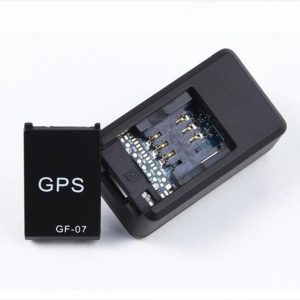The concept of GPS tracking offers undeniable benefits. From monitoring valuable assets like vehicles or equipment to ensuring the safety of loved ones, GPS trackers provide real-time location information and peace of mind. However, the possibility of someone placing a GPS tracker on your car or belongings without your knowledge can be unsettling.
This comprehensive guide explores GPS tracker finders: the technology used to detect hidden tracking devices, effective methods for locating them, and the steps to take for removal. It also addresses the legality of GPS tracking and what to do if you find a suspicious device on your property.
Understanding GPS Trackers: How They Work and Where They Might Be Hidden
Before diving into detection methods, let’s understand how GPS trackers function. Most GPS trackers rely on a combination of GPS (Global Positioning System) technology and cellular connectivity. GPS provides location data, and cellular connectivity allows the tracker to transmit that data to a monitoring platform.

These trackers can be very small and discreet, making them difficult to detect. Here are some common hiding spots for GPS trackers on vehicles:
- Under the vehicle: Tra trackers can be magnetically attached to the undercarriage, wheel wells, or bumpers.
- Inside the vehicle: Common hiding spots include under the dashboard, behind the stereo, or inside glove compartments.
- On the vehicle: Trackers can be discreetly placed on the exterior using strong adhesives, such as behind the license plate or under the frame.
The Elusive Hunt: Methods for Detecting Hidden GPS Trackers
While there’s no guaranteed foolproof method, several approaches can increase your chances of finding a hidden GPS tracker. Here are some effective techniques:
- Visual Inspection: A thorough visual inspection of your vehicle is a crucial first step. Look for any foreign objects, particularly small devices with antennas or blinking lights, in the common hiding spots mentioned earlier.
- Radio Frequency (RF) Detection: RF detectors can pick up on the radio frequencies emitted by GPS trackers. These detectors are readily available online or at electronics stores. While helpful, they might not distinguish between a GPS tracker and other devices emitting radio signals.

- GPS Detector Apps: Several phone apps claim to detect GPS trackers by scanning for Bluetooth or Wi-Fi signals used by some trackers. The effectiveness of these apps can vary, and some might require in-app purchases for full functionality.
Beyond the Basics: Advanced Techniques for Experienced Users
For those comfortable with a more technical approach, here are some advanced methods for detecting hidden GPS trackers:
- Cable Signal Detectors: These specialized detectors can identify hidden wiring used to power GPS trackers hardwired into a vehicle’s electrical system.
- Drone or Thermal Imaging Cameras: While not a common solution for everyone, drones or thermal imaging cameras can be used to scan a vehicle for hidden objects that might emit heat signatures, potentially revealing a tracker’s location. However, acquiring and operating this equipment requires technical expertise and might not be practical for most users.
Taking Action: What to Do If You Find a GPS Tracker
If you discover a suspected GPS tracker on your vehicle, here are the steps to take:
- Document Everything: Take pictures and videos of the tracker from various angles. Note its location on your vehicle and any identifying markings.
- Remove the Tracker Safely: If you can safely remove the tracker without tampering with any wires, do so. Place it in a secure location for further investigation.
- Report the Incident: File a police report and inform them about the discovery of the tracker. They might be able to trace the device back to its source and investigate potential privacy violations.
- Consult with an Attorney: An attorney can advise you on your legal rights and potential courses of action, especially if you suspect the tracker was placed without your consent.
The Legality of GPS Tracking: Understanding Your Rights
The legality of GPS tracking depends on several factors, including:

- Consent: It is generally illegal to place a GPS tracker on someone’s vehicle or belongings without their knowledge or consent.
- Purpose of Tracking: Tracking a minor child or an employee-owned vehicle used for business purposes might be permitted under certain circumstances with proper consent.
- Local Laws: Laws governing GPS tracking can vary by state. It’s advisable to research the specific laws in your area to understand your rights and the potential legal implications of finding a hidden tracker.
Taking Control: Protecting Yourself from Hidden GPS Trackers
While the possibility of hidden GPS tracking can be unsettling, there are steps you can take to mitigate the risk:
- Regular Inspections: Develop a habit of periodically inspecting your vehicle for any suspicious devices.

- Invest in a GPS Detection System: Consider purchasing a reputable GPS detection system or jammer (if legal in your area) to deter potential tracking attempts. Ensure you understand the legality of GPS jammers in your location before using one.
- Be Mindful of What You Share Online: Avoid sharing your location or travel plans excessively on social media, as this information could be used to track your movements.
- Disable Location Services: When not in use, consider disabling location services on your phone and other electronic devices to minimize the risk of your location being monitored.
Empowering Yourself with Knowledge: Conclusion
The possibility of hidden GPS tracking can be a concern, but knowledge is power. By understanding how GPS trackers work, the methods for detecting them, and the legal implications, you can take proactive steps to protect your privacy and security.

Don’t let the fear of hidden GPS trackers hold you back! With the information in this guide, you can take control of the situation. Perform regular inspections, consider investing in detection tools if necessary, and be mindful of your online footprint. By following these tips, you can minimize the risk of unauthorized tracking and enjoy greater peace of mind.